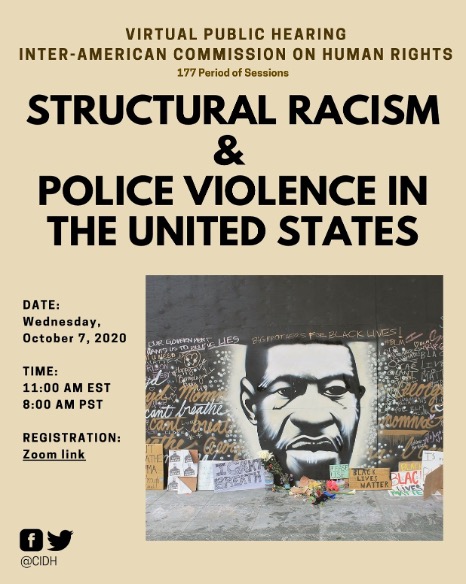By IHRC students Diann Jayakoddy & Maxwell Nelson
In Fall 2020, Santa Clara Law’s International Human Rights Clinic (IHRC) provided a written submission to the Inter-American Commission on Human Rights (IACHR) for its Thematic Hearing on “Structural Racism and Police Violence in the United States.”

The IHRC worked in conjunction with these partner organizations.
In requesting and preparing for the hearing at the IACHR’s 177th Period of Sessions, the IHRC worked in conjunction with fellow petitioners the American Civil Liberties Union, the Center for Justice and Accountability, Mothers Against Police Brutality, US Human Rights Network, Robert F. Kennedy Human Rights, and the Thurgood Marshall Civil Rights Center at Howard University.
The thematic hearing took place on October 7, 2020, following the release of the IACHR’s 2018 report on Police Violence Against Afro-Descendants in the United States, and a sustained concern for the treatment of African Americans by U.S. police, especially after the murder of George Floyd by Minneapolis police officers.
The IACHR’s 2018 report was released after the Commission conducted site visits to different American cities, published press releases, and held multiple hearings on racism and police violence between 2014-2017, including its 2017 hearing on Impunity and the Lack of Accountability for Extrajudicial Killings by Law Enforcement in the U.S. at the 166th Period of Sessions where the IHRC also provided a written submission to the Commission.
Much like the IHRC’s 2017 written submission, its 2020 submission sought to supplement the hearing’s testimony and provide the Commission with information and perspectives regarding police brutality and racism.

The flyer for the October 7, 2020 thematic hearing
on structural racism and police violence in the U.S.
At the 2020 hearing, commissioners heard personal testimony from mothers who lost their children at the hands of police via a video montage that emphasized the human toll police brutality has upon countless African American families in the United States. The hearing can be viewed here.
In support of this testimony, the IHRC’s written submission provided information and analysis to the IACHR about how U.S. domestic law requires action at the state level to reform police accountability and use of force laws; how the goals of the emergent “defund the police” movement coincide with principles of international human rights law, and how police unions contribute to impropriety and a culture of impunity across police departments.
Under international human rights law, nation states have a general obligation to refrain from interfering with individuals’ human rights; to take all necessary measures to prevent, or protect, individuals’ human rights from being violated by others; and to adopt positive measures to facilitate, or guarantee, the enjoyment of individuals’ human rights.
Relatedly, nation states have the human rights obligation to ensure the rights to life, health, and education are secured by all individuals by taking affirmative actions to those ends.
Principles of equality and non-discrimination are also fundamental to human rights law, and nation states have the obligation “to adopt the measures necessary to recognize and guarantee the effective equality of all persons before the law; to abstain from introducing in their legal framework regulations that are discriminatory towards certain groups either on their face or in practice, and to combat discriminatory practices.”

The mothers of five men killed by police, Jarvis Lykes, Daron Gaylor, Jemel Roberson, Clinton Allen, and Tory Sanders (shown in order above)
presented testimony before the IACHR on October 7, 2020.
In the IHRC’s submission, these basic human rights principles were highlighted. In particular, the submission drew the Commission’s attention to the ways in which police unions perpetuate a form and culture of policing that is out of step with the government’s obligation under international human rights law to respect, protect, and guarantee every individual’s human rights and to actively ensure equality and non-discrimination.
Moreover, the submission outlined how the federalist structure of the U.S. government places upon the individual states the responsibility to ensure that police departments respect, protect, and guarantee every individual’s human rights and to actively ensure equality and non-discrimination.
Finally, the IHRC’s submission discussed how the “defund the police” movement reflects themes of restorative justice whereby funding allocations can be redirected from incarceration and crime prevention to mental healthcare, education, and reparations for historical harms done to African Americans at the hands of police. Consequently, such reallocations can go a long way to ensuring that U.S. states are respecting, protecting, and guaranteeing the life, health, and education of individuals.
In an effort to continue advocacy for this issue, particularly after this recent presidential election, the IHRC, along with the other petitioners, will engage in next steps to follow up with the IACHR.
In December 2020, the IHRC, pursuant to Human Rights Council resolution 43/1, also responded to the Office of the United Nations High Commissioner for Human Rights’ Call for Input on the “Promotion and protection of the human rights and fundamental freedoms of Africans and people of African descent against excessive use of force and other human rights violations by law enforcement officers.” In its written submission, IHRC students again addressed U.S. domestic law, the defund the police movement, and police unions.